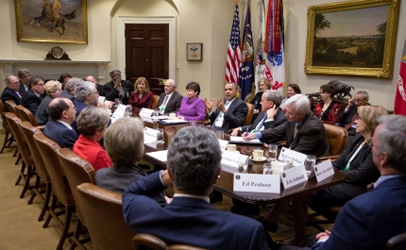 cial meeting held this past Friday, President Obama’s Council of Advisors on Science and Technology (PCAST) discussed and voted to approve its upcoming report on antibiotic resistance.
cial meeting held this past Friday, President Obama’s Council of Advisors on Science and Technology (PCAST) discussed and voted to approve its upcoming report on antibiotic resistance.According to PCAST co-chair Dr. Eric Lander, the report calls for a new interagency task force and a standing advisory council, additional funds to strengthen state and local public health infrastructure for surveillance and response, expanded use of more advanced technological surveillance such as DNA sequencing, and the creation of new antibiotics.
The PCAST strategy involves surveillance, stewardship, and continued development of antibiotics or other treatments.
Vice-chair William Press said the report is “terrific” and highlighted that it looks at the role of agriculture in a “rational and dispassionate way.” Controversy over the issue sometimes comes when communities just aren’t communicating with each other, he said.
This PCAST report was informed by a working group that involved people from big agriculture companies and from the public health community.
“As we sought people’s views, as we asked people to point us to literature, we then asked everyone to critique the literature that was being cited in all directions,” Lander said.
The council also received many suggestions and studies from the scientific public at large.
“I fully understand the passions on all sides of the question,” Lander said. “We’d like more data on some things, but we also recognize that there are actions that have to be taken, given the data we have.”
He mentioned FDA Guidance #213, which will ban the use of antibiotics for growth promotion in food animals.
“We ought to see a decrease as a consequence of that,” Lander said.
This was an important point for Susan Vaughn Grooters, a policy analyst at Keep Antibiotics Working, and Gail Hansen, a senior officer for Pew’s campaign on human health and industrial farming.
“I hope that animal agriculture heard that loud and clear,” Grooters said.
PCAST is aware of concerns that companies could continue to use antibiotics under a “disease prevention” label rather than for growth promotion, Lander said. He said he believes veterinarians will keep this from happening, but it’s “something we’re going to have to monitor. If we don’t see a decrease in use of antibiotics when one of these major uses — growth promotion — will be withdrawn, then that’s a pretty serious signal.”
If use doesn’t decrease, there will need to be further action, he said.
Lander also said that the report calls for the development of new methods for achieving the benefits to agriculture that are currently associated with antibiotic use. Probiotics was one suggestion.
Grooters said she wants to see more leadership from the White House on the antibiotic usage on farms. Stewardship in food production needs more attention, but there also needs to be a paradigm shift in agricultural practices.
“We can’t go on with our overcrowded, insanitary conditions of raising food animals and then relying on antibiotics to support that system,” she said.
“Our report has to focus on immediate steps, that in the short term can help mitigate the challenge that we face,” said PCAST member Christopher Chyba. However, “this isn’t some kind of conflict that can be won. Our relationship with microbes is a relationship that has to be managed forever.”
This is why the report also addresses “medium and long-term” steps to help manage the relationship, he added.
“The bacteria don’t really care how much we discuss or inspect or make policy. They’re going to keep on doing what they do doing,” Hansen said.
The report was unanimously approved by the council, but it still has to go through an editing process before it can be released to the public. Lander said he expects the report to be released “in the next several weeks.”







